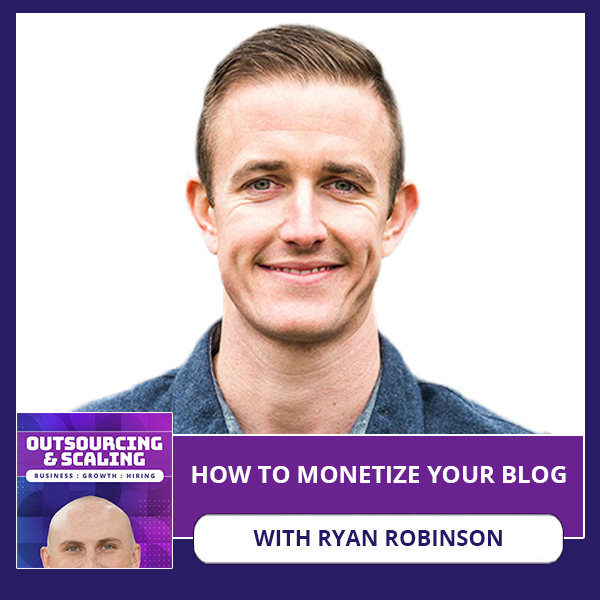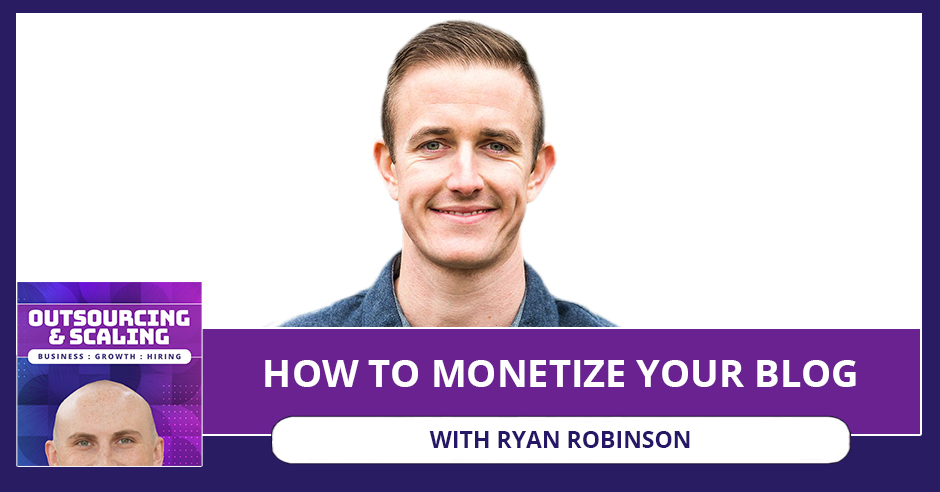


Hundreds of millions of people read billions of pages of blogs every day. With this number, you can surely gain something from any quality blog you produce. Today, Nathan Hirsch talks to Ryan Robinson, a blogger, podcaster, and side project aficionado that teaches 400,000 monthly readers how to start a blog and grow a profitable side business. Ryan recalls how he first got into business during his college days, working for someone after college, and jumped into his own thing. He shares some hiring advice when looking for writers, including the need for test projects, giving feedbacks, and handling revisions. He also discusses how you can monetize your blogs and turn it into a whole new business.
—
Listen to the podcast here:
[smart_track_player url=”https://www.podetize.com/statsapi/www.podetize.com/wp-content/uploads/fileuploads/11-5b145ef137b51b3d1af0633e9305c43d/03/2020/673c3553d116f7fc339bbd0097dde5b0.mp3″ title=”How To Monetize Your Blog With Ryan Robinson” artist=”Nathan Hirsch” image=”https://freeup.net/wp-content/uploads/2019/04/OAS.png” ]
Download the audio file here.
How To Monetize Your Blog With Ryan Robinson
My guest this episode is Ryan Robinson. Ryan, how are you doing?
I’m good. Thanks for having me.
I’m pumped to talk to you. We’re both in engaged mode. I know you have a wedding coming up. I also have to start planning mine. We’re in very similar parts of our life. For those of you that don’t know, Ryan’s a blogger, a podcaster and side project aficionado that teaches 400,000 monthly readers how to start a blog and grow profitable side business at RyRob.com. We’re going to dive all into that but first let’s take a gigantic step back. What were you like as a kid growing up? Were you a straight-A student? Were you a rebel? Did you know you wanted to be an entrepreneur?
I’m somewhere in between the straight-A thing and the rebel thing. Both of my parents are entrepreneurs. My dad had a construction business my entire life. My mom ran a tutoring company. From them, I was always raised with this idea that you create your own opportunities and that’s always been a constant theme in my life. I always had this core motivator to build my own business. Reaching back when I was in college was when I first started experimenting with that myself. To your straight-As question, my very first semester of high school I got a 1.7 something GPA and had to have some reality resetting with my parents. I utilized that tutoring company that she owned and I turned around my motivation, study habits, at an early age. I eventually did get up to the 4.0 plus GPA club. In college was when I started testing out my real entrepreneurial chops.
Tell me about that. I started a business when I was a sophomore in college. It was a pretty crazy experience. A lot of people have heard that story a million times. I’d love to hear yours. What was that like running a business while you were in college and what did that look like?
It was a lot of fun. To set the stage here context-wise, this was in 2008 when the US economy was melting down. My mom’s tutoring business was going through a downturn cycle because tutoring is a luxury service that a lot of people would put off in an economic downturn. I was like, “This is becoming real. I can’t rely on my parents. I can’t use their credit card forever.” That was the impetus of wanting to try my own thing. The first product I started working on was called the iStash. It came to me as I was going through concert security. It was Coachella with a bunch of friends. We wanted to get some cigarette shaped items snuck in through security and I had this a-ha moment where I was passing my cell phone around the metal detectors. I thought, “What if I have a stash device that looks like a phone?” What a genius idea. That was the idea where the product was born.
That’s when the fun started happening. I was able to find a manufacturing partner in China based on a cousin of one of my friends from fraternity. They made Pokémon card sleeves but was plugged in with tons of factories. From there, I started piecing together what the business looked like. I sold about 6,000 iStashes over the next couple of years. I lost a little bit of money in the process but learned some important lessons about product margins, how to distribute and how to price well. I got a lot of cool lessons from it.
What was the coolest thing that happened to you as a young entrepreneur? Was there any story that you’re like, “I can’t believe I made that much in a day,” or, “I got to meet this person?”
One of the fun moments was when Troy Polamalu, a football player, bought one of my iStashes. His press manager reached out to me individually and she was like, “I can’t have Troy be seen to purchase this thing overtly, but we want to get a few for him, his friends and his family.” He got a bulk order and I was super pumped about that. That was one little tiny shining moment. Also, I learned a lot too that would go on to fuel what I’m doing now about how to market a product, how to engineer press hits, things like that. Getting my first real features on major tech magazines, gadget magazines, that kickstarted the engine that pushed me into the marketing I’ve done since.
Did you end up getting a job out of college or you go right into full-time entrepreneurship?
I got a job right after college. I literally started the Monday after graduation. For those of you reading, if you are of age and are graduating college soon, I highly recommend taking some time off to go have fun, travel, do something without super strict work constraints because this is a big transition. I was able to land my job working for this company that made speaker products and they were on Shark Tank. They got a deal with Robert Herjavec, which was pretty cool. That also led to some connections where I’ve interviewed Rob for other projects I’ve worked on since. The trace of this through line, which of course you can only do looking back at your past. You can never plan these things super coherently in the present. That job was cool. It introduced me to marketing. I did some more product work. I ran their blog as well and that’s when I got more comfortable with writing. It was a great experience. I wouldn’t trade it for anything.
Were you doing side projects at the time or were you staying focused on your job?
At the time, I was still selling some iStashes, trying to offload inventory so that I could get this thing out of my head and out of my garage, now that I determined it wasn’t going to be a business that I was going to run for the future. Around then was also when I started working on a different business with one of my best friends and my roommate at the time. It’s called Case Escape. We have these little printers that can print any image directly onto a phone case. We were selling them at the LA County Fair. We also had an Etsy shop where we were selling pre-made trendy designs at the time, when Etsy was blowing up in about 2012.
I’ve always had little things that I had going on. That business ended up taking off. We generated about $160,000 in revenue our first year. We focused on it full-time a little bit. I left my day job after only about 1 to 1.5 years working for the company. We focused on Case Escape for a bit. Another big lesson I learned was about not quitting my job too soon, because it ended up being that revenue plateaued as I quit my day job. It hit its peak and was steady at a level that is a great income for one person, but a crappy income for two people. I ended up selling my half of the business to my business partner. That’s when I moved to San Francisco and started working with tech companies.
Walk us through that. What was it like quitting your job? Were you working for the tech companies or you started a tech company?

I’m working for tech companies.
What did you learn working for tech companies that you still apply now?
One of the biggest things has been the analytical and systematic approach to content marketing. I started working with blog content and how to drive traffic to a website since I was in college. That was a comfortable thing for me. However, when I started working for CreativeLive, mainly the online education company, they had a growth team. The guy that hired me was the director of growth and he was a brilliant MBA from Stanford and has done things with a spreadsheet that I’ve never seen anyone else do. This guy comes with a crazy analytical approach to content marketing. For me, it was amazingly beneficial to work with someone who was tracking very specific metrics to what indicates successful content. What growth rates for content should look like over the course of the first 60 to 90 days after it’s published. How to tell which pieces are going to be successful based on early momentum, just crazy insightful things. I walked away with a fully built skillset after a couple of jobs working with smart people like this, much smarter than myself but I got the benefit from it for sure.
When did you transition to being a full-time entrepreneur?
I kept different day jobs going through Intel. I had little stints where I was a full-time freelancer, which I would call entrepreneurship because I had no dependable monthly recurring income coming into me. Early 2019 was when I finally cut the cord. I left my last day job working for Close which is a CRM company. I made the jump to blogging full-time back in May of 2019. I did a lot to build up what my monthly income looked like before making that cut. I’ve had a couple of times now where I’ve quit my day job too soon. My threshold for what it takes to jump into my own thing has steadily gotten higher and higher.
Are you working by yourself? Have you hired people? Are you using VAs or freelancers?
I’m a one-man company with a lot of contractors who help me out.
How are you using them?
I work with primarily writers. I have five writers who are always working on something for me, whether it’s blog post drafts or editing something that’s a year old, beefing something up that needs fresh content or examples. VAs as well to help me do things like porting a Google Doc over into the correct format in WordPress or taking a listicle that has 50 different items in it and going and sourcing 50 high quality images to go along with that. Tasks that can take lower effort, but time intensive tasks off of my plate, that’s what I try and strive for.
A lot of people struggle hiring good writers. At least they find someone who they think is a good writer, but they struggle to get them to write in the style that they want for their blog. What tips and advice do you have for them?
Always do test projects. I’m a big fan of working super hands-on with brand new writers on curating an outline that’s going to be more or less exactly what I want, as long as they deliver on the quality standards that I’m hoping for. Backing up a little bit, I always try and look at real examples of work that they’ve published. Whenever a writer reaches out to me or I find someone on a good marketplace like FreeeUp, I always ask for samples for them to provide. I want to see what they’re telling me their best work is and then I’ll evaluate that. Look and see if the level of depth and the style is somewhat a match for me.
I try not to be too much of a stickler on style because everyone is different in how they write and think and progress through different sections of an article. I try and use a test article, which is paid. I always do a paid test so they’re incentivized to want to do well. I always use the test article to gauge how well they are going to eventually adapt to my voice. To be totally honest, it takes most writers a few articles to hone in on what my style, my voice is. Even to this day, of the five writers I work with, one of them I’ve been working with for over two years. Only some point in 2019 did he get to the point where if I was in a pinch, I would publish something sight unseen from them because he’s gotten to nail my voice and style. It takes a long time. There are no shortcuts that I know of.
You mentioned paying for test projects, which is something that I believe in as well. How do you handle revisions? How do you handle when you’re giving feedback that they have to redo time? There’s an argument of are you paying for the time or are you paying for the result? What are your thoughts on that?
I’m a big proponent of paying for the result. I tend to not work with any of my writers on an hourly base. Usually it’s like, “Here’s a flat rate for an article,” or, “Here’s what a monthly rate is going to be for X number of articles.” I’m paying for deliverables and then building into it if they need to do revisions. I’m also always upfront with them saying that, “I don’t need more than 1 or 2 rounds of revisions total.” I try and hold true to that because with something that a person is investing 5, 10 hours of their time in. I don’t want them to have to unexpectedly double or triple that. Sometimes when an article comes back as far below where I needed it to be, I will put in that time and say, “This was a hiring mistake on my part.” I’m going to put in that time to finish the article up, get it up to where it needs to be and will likely part ways with that writer unless there’s some way to make a major adjustment moving forward, but paying for deliverables is the way to go.
Is there any bad hiring experience, any horror stories that stand out to you?

I’d be hesitant to say horror stories, but I definitely have overpaid for someone who I thought was going to be a good writer. With a test piece alone, I’ve gotten back 5,000 words of close to garbage. Stuff that I couldn’t say was copied and pasted from somewhere else on the internet. It didn’t read like an intelligently well thought out article, despite their prices being set at a more premium writer level. My biggest mistake has been hiring a couple of people for test projects over the years with a complete miss on expectations for quality versus what their rates are.
What about one of your best hires? You’ve worked with people for two plus years. What makes them so good? They have to be a good writer. You mentioned their voices. Are there other qualities that make them a good contractor to work with?
These are the people that I have to tell them they need to charge me more because they totally undervalue how great they are. Thinking of my number one writer in mind right now, he’s someone that I got to know by reading his content on many of the sites that I write and read for. He’s someone who I had already identified with like, “You’re already on my writing level. You’re in these places that I associate myself with.” Honestly, he’s a better writer than I am even.
Looking at the way they like to cite different types of sources throughout their articles. The structure of a post, being able to think outside of the box and write in different ways also is cool. Seeing someone who can take a listicle and then also write a how-to piece or something more creative that doesn’t have as much structure, that’s what I find is rare. Because me personally, I’m good at the linear logical progression of a how-to article, but writing something that has less of a rigid structure, but you still want to get to a clear purpose at the end? That’s more difficult for me. Someone who can do all these different types of content pieces, that’s what I find rare.
I want to switch to writing a blog because a lot of people want to monetize their blog. They might be a good writer. They might have a little bit of a following or a good following, but they can’t turn that into a business. Can you speak on that a little bit?
I’ll be the first to tell you that it’s not easy. It took me a long time to monetize my blog, especially when we’re talking about passive ways. For the first three years of my blog, I monetized by selling my services. Something that’s not super scalable, aside from however much I can increase my prices. I got lots of inbound leads from clients who wanted to hire me to create the types of content I was publishing on my blog, but for their sites. Being in San Francisco, I’m plugged into the startup scene. I got lots of referrals from friends, previous coworkers that moved on to other companies. Being in the center of a lot of that was helpful to jump starting my career.
Mostly freelance and consulting got my blog up to $10,000 to $15,000 a month in attributor revenue. It wasn’t until I started dialing in a lot of my affiliate programs, releasing some of my own courses and other digital products that revenue started to skyrocket from there. The biggest lever to turn is when you can figure out an affiliate channel that works well for you. What that usually looks like to me is identifying keyword opportunities that have a clear connection to a product or a service that you can become an affiliate of. That does need to fall within the niche that you want to write about, things you’re interested in and then topics that you can lend your own experience or skills to. That’s a necessary umbrella for this stuff.
From there, where are the keyword opportunities? How many people are searching for things like how to start a blog? How to be a freelancer? What can you recommend at different points along that journey as far as tools, products, services that are mutually beneficial? You earn because they’re benefiting by choosing a hosting company to start their blog or by using a freelance tool set to manage their invoicing and contracts. Things that are genuinely beneficial to your readers. That’s what I see is the real win-win as far as affiliate goes.
Finding your traffic sources, that’s another big component of this. You’ve got Google search. Organic traffic, that’s a big one. If you can figure out how to dial in your conversion rates on these posts, you can also scale up things with Facebook ads. You can get good at Pinterest, networking with other pinners who have huge group boards where you can share your images and drive traffic back that way. There’s lots of different ways to drive traffic.
How many different revenue streams do you have? Are they one or a lot more than the other? How do you divide up your time across those revenue streams? Don’t think about exact numbers but ballpark it percentage-wise. Can you give people a bit of a breakdown?
I’m heavily lopsided towards affiliate income. I’m about 70% to 75% from affiliates. My biggest affiliate is Bluehost. People who choose to start a blog after reading some of my content, if they register their website with Bluehost, choose a hosting plan with them. That’s where the bulk of my affiliate income comes from. There are about twenty other affiliates that vary month to month in how they’re doing as far as commissions go. After affiliates, the next biggest one at 15% to 20% is usually sales in my own digital products, courses, eBooks, templates, things like that. Beyond that, I get the haphazard, occasional sponsored posts on my blog or podcast sponsorship. There are blog ads probably somewhere between 5 and 10 major income sources, but it tapers off big time after affiliates, digital products and sponsorships.
Ryan, this has been great. Where can people find out more about you and what are you most excited about coming up?
I’m at RyRob.com. That’s the home base for everything. I’m also super accessible. If you have blogging questions, I’m just Ryan@RyRob.com. I’m working on a major overhaul to my flagship blogging course. It’s called Built to Blog. It covers everything that I’ve done for my journey through to how to design a blog all the way up to writing compelling content. Getting it to rank well in search engines and then monetizing your blog. That’s my super main focus.
Thanks so much for coming on. I appreciate your time.
Thanks for having me.
Important Links:
- Ryan Robinson
- Case Escape
- CreativeLive
- Close
- FreeeUp
- Bluehost
- RyRob.com
- Ryan@RyRob.com
- Built to Blog
About Ryan Robinson
 Ryan Robinson is a blogger, podcaster and side project aficionado that teaches 400,000 monthly readers how to start a blog and grow a profitable side business at ryrob.com.
Ryan Robinson is a blogger, podcaster and side project aficionado that teaches 400,000 monthly readers how to start a blog and grow a profitable side business at ryrob.com.
